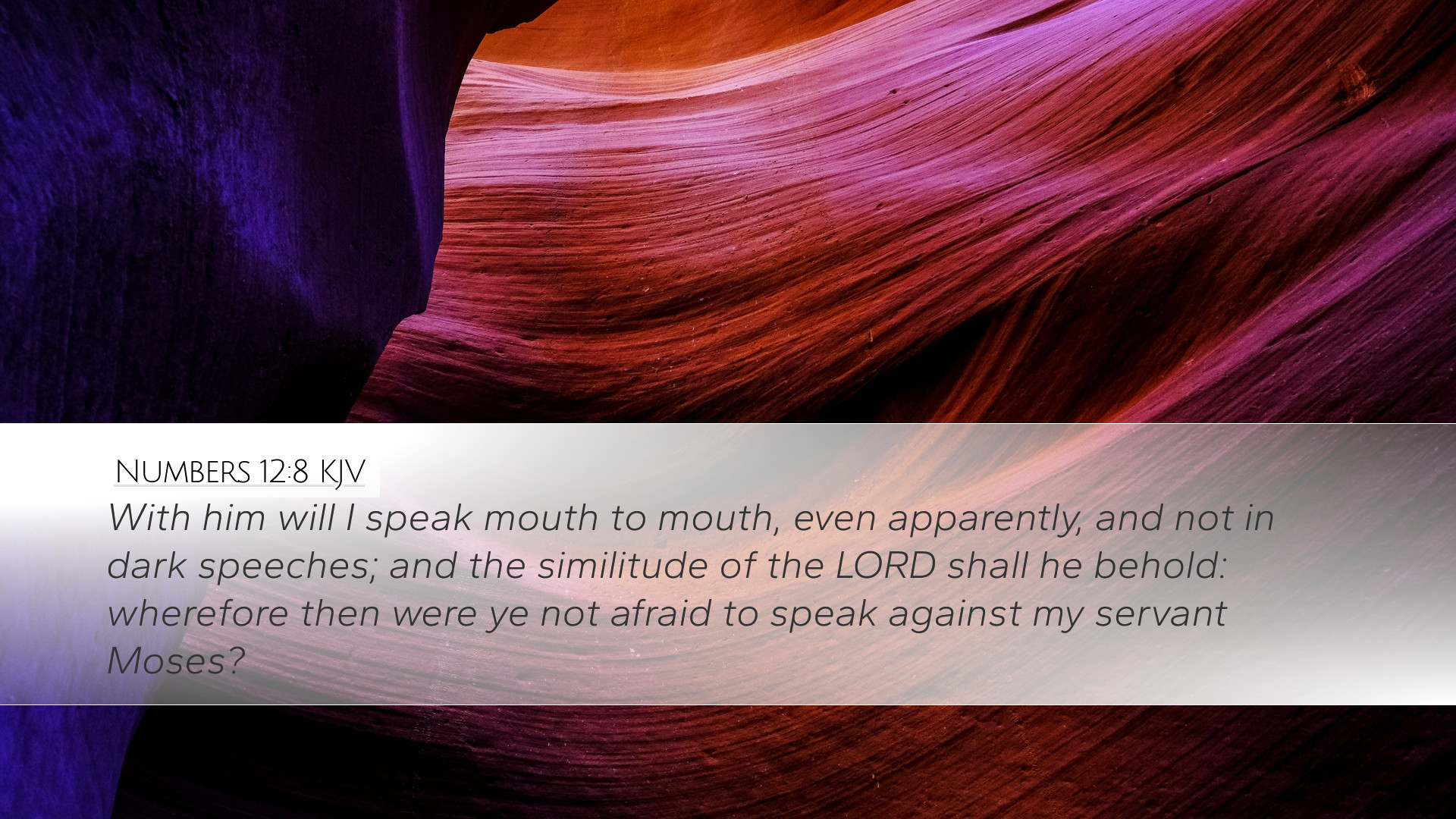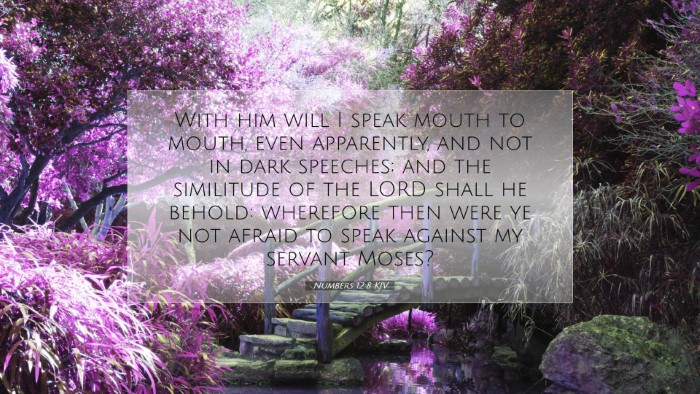Commentary on Numbers 12:8
Verse: Numbers 12:8 - "With him I speak mouth to mouth, even apparently, and not in dark speeches; and the similitude of the LORD shall he behold: wherefore then were ye not afraid to speak against my servant Moses?"
Introduction
The narrative surrounding Numbers 12:8 is a pivotal moment reflecting God's authority and the unique relationship He had with Moses. This verse captures a significant rebuke delivered by the Lord, emphasizing the elevated status of Moses as His chosen servant. Commentary from respected public domain sources provides profound insights into the implications of this verse for faith, leadership, and divine communication.
Exposition of the Text
This verse is part of a broader account where Miriam and Aaron, Moses' siblings, speak against him due to their jealousy and dissatisfaction. The Lord's response is not only a defense of Moses but also an affirmation of his prophetic role. The distinction between the communication styles of God with Moses and others is particularly salient. Let's delve into various commentary perspectives:
Matthew Henry’s Commentary
Matthew Henry underscores the intimate communion that God had with Moses. He notes that while God communicated with prophets through visions and dreams, Moses was favored to receive direct revelation “mouth to mouth.” This highlights Moses’ extraordinary role and closeness to God, a relationship that was not to be undermined or questioned by others.
- Intimacy in Communication: Henry emphasizes that the "mouth to mouth" communication signifies an unprecedented level of revelation between God and Moses, indicating not only clarity but also a covenantal intimacy.
- God's Defense of His Servant: God's rhetorical question at the end of the verse serves as a powerful reminder to Miriam and Aaron about the consequences of disrespecting God's chosen leader. This serves as a warning to all who would rise against God's appointed leaders.
Albert Barnes’ Notes on the Bible
Albert Barnes points out that the phrase "dark speeches" refers to the more obscure forms of divine communication received by other prophets. Moses enjoyed a clarity that few others experienced, signifying his unique position among the people of Israel. Barnes elucidates how this distinction was not merely about Moses’s superiority but pointed to God’s sovereign choice.
- Prophetic Hierarchy: Barnes discusses the hierarchy present in prophetic roles, noting that while all prophets were honored, Moses held a singular distinction due to his direct relationship with God.
- The Similitude of the Lord: The mention of seeing the "similitude of the LORD" suggests a level of divine revelation that transcends what others could perceive, underscoring the privilege granted to Moses.
Adam Clarke’s Commentary
Adam Clarke elaborates on the implications of this divine relationship. He emphasizes that Moses was not only a leader but a mediator between God and the Israelites, establishing him as a crucial figure in their history. Clarke also reflects on the "fear of the Lord" that should accompany any opposition to divine authority.
- Fear of the Lord: Clarke notes that the fear exhibited by those who oppose God's servants is a grave matter, beautifully illustrating God's protective nature over His appointed leaders.
- Divine Visibility: He expounds on the idea that while Moses had the privilege of divine visibility, it was accompanied by responsibility, and this dynamic reveals a deeper theological truth about leadership and stewardship in God’s kingdom.
Theological Insights
This verse and its commentary illuminate several key theological themes that resonate with the contemporary ecclesiastical context:
- The Authority of God’s Servants: The divine defense of Moses serves as a reminder of the importance of respecting God-appointed leadership in the church today.
- Divine Communication: The different modes of communication from God demonstrate His sovereignty in choosing how He reveals Himself to humanity. This can inspire leaders to seek intimacy with God for guidance.
- Consequences of Rebellion: The incident reminds believers of the dangers of dissent against God’s chosen leaders, calling for a spirit of submission and humility within the church.
Conclusion
Numbers 12:8 serves as a critical reminder of Moses’ exceptional relationship with God and offers insights into the respect due to spiritual leadership. The commentaries of Henry, Barnes, and Clarke provide a well-rounded understanding of the depth of this verse, emphasizing the theological significance of divine communication, authority, and the seriousness of opposing God’s chosen leaders. As students, pastors, and theologians reflect on this passage, it challenges them to consider their own relationship with God as well as their attitude towards ecclesiastical authority.


